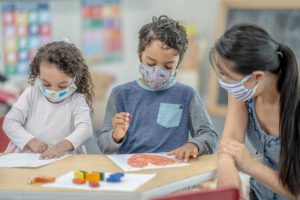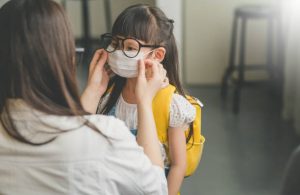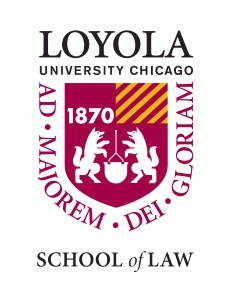Thirteen-year-old Greyson Schwaigert is forced to risk his life to receive an adequate education. Greyson suffers from a rare genetic disorder, which means that COVID-19 poses a threat to his life. On top of that, Greyson has a developmental delay, so he does not understand that he must wear a mask for his safety. Greyson can only receive the special education services and socialization that he needs through in-person school. Therefore, his safety depends on the actions of those around him. His safety is being endangered due to the Tennessee Governor’s decision to issue an executive order that allows parents to opt their children out of mask mandates.
Greyson’s mother, Brittany Schwaigert, is a named plaintiff in a class action lawsuit challenging the Governor’s opt-out order. Schwaigert is one of many named plaintiffs in class action lawsuits across various states, including Florida, Utah, Texas, and South Carolina, who have sued governors for similar executive orders.
The class actions do not demand that schools institute a mask mandate, but rather the class actions ask that schools require masks according to regional health data measurement. Studies from the Centers for Disease Control and Prevention (“the CDC”) have shown that schools that do not require students to wear masks were more likely to have COVID-19 outbreaks. Such studies demonstrate that mask wearing reduces the spread of COVID-19.
Beyond the class actions that have been filed, the Office for Civil Rights, within the United States Department of Education, launched an investigation as to whether prohibitions on masking discriminate against students with disabilities.
The Americans with Disabilities Act (“the ADA”) and Section 504 of the Rehabilitation Act (“Section 504”) require school districts to provide disabled students with a free appropriate public education (“FAPE”). A FAPE consists of specialized instruction to meet the unique needs of a child. Allowing any student to opt out of the mask mandate is a violation of the ADA and Section 504 because such a policy fails to provide a FAPE for disabled students who need in-person instruction. When a student must risk his life to obtain the requisite education, there is something wrong.
Mask-Wearing Exemptions Should Only Apply Where Necessary
Students are exempt from the mask-wearing policy if mask wearing is unsafe due to physical, developmental, or behavioral impairments. These categories that warrant mask-wearing exemptions are, however, quite narrow. Pediatric providers may determine that a student is medically unable to wear a mask if the child has a medical contraindication and/or the child is developmentally disabled, physically or mentally, such that they are unable to remove a mask if needed. Some examples of conditions that might make students unable to wear a mask are developmental delays, limited physical mobility, severe autism, and structural abnormalities of the head and neck.
The exemptions to mask-wearing should remain narrow. If students could opt out of mask-wearing for any reason or no reason at all, then that would increase the spread of COVID-19 and put the lives of students with pre-existing conditions at risk.
Some students who are exempt from mask-wearing need to attend in-person school to receive a FAPE. If a school is offering in-person education to other students, then students with an Individualized Education Plan (“IEP”) or a 504 Plan may not be denied access to an in-person education. Nevertheless, remote learning is recommended for children who are at high risk of infection due to a weakened immune system.
These rules do not address what happens when a child has a compromised immune system, cannot wear a mask, and needs in-person learning. Although the student’s compromised immune system makes him at high risk of infection, he cannot receive a FAPE through remote learning because the special education services are only available in the school itself. The student’s parents are faced with two options: 1) have their child do remote learning and be safe from the virus, but unable to receive a FAPE or 2) learn in school and receive a FAPE, but be unsafe from the virus. No one should have to choose between health and education.
Time is of the Essence to Save Children’s Lives
The courts need to prioritize this issue and act quickly because the lives of students who have a compromised immune system, cannot wear a mask, and need in-person learning are at risk. A federal judge blocked the Tennessee Governor’s order from being enforced, but that ruling is only temporary. While other judges should follow this judge’s example to protect students while litigation is pending, that is not enough. Students and their families need a long-term solution. State legislatures should require students to wear masks and/or regularly get tested for COVID-19 where they attend schools with students who have compromised immune systems, cannot wear masks, and need in-person learning to receive a FAPE.
Yet we should not solely rely on these institutions. Classmates of disabled students have a responsibility to protect the health of their peers who are unable to take precautions on their own. While there are school officials who are defying their governors’ bans on mask mandates, that is not the case everywhere in the country. Parents should be cognizant of whether any of their children’s classmates have a pre-existing condition coupled with a disability that prevents them from wearing a mask. If parents learn that some of their children’s classmates fit into that category, then they should regularly test their children for COVID-19 and/or instruct them to wear masks and practice social distancing. Parents should do this regardless of whether the law requires it or health metrics suggest it because the nature of this virus is such that it often spreads before the data is able to reflect that. While there are some concerns that requiring children to wear masks in school will harm their social and emotional development, protecting the lives of students with disabilities and pre-existing conditions takes precedence.
Community members can aid in this endeavor by changing the framework for how COVID-19 in children is discussed. The dominant narrative is that the young, especially children, are not seriously affected by COVID-19 like older folks are. Community members can challenge this narrative by explaining that some children have pre-existing medical conditions and could become severely ill or even die upon contracting COVID-19.
“We hear all the time, ‘Oh, only kids with pre-existing conditions are the ones that get sick and die,’” Schwaigert said. “Well, that’s my kid. That is my child. He has a lot of pre-existing conditions, and he matters.”
Time will tell if the courts, communities, and classmates across this nation will heed this health crisis and take prompt protective measures to ensure that disabled students receive the education they are owed by law while remaining safe.
Maria Kardasis is a law student at Loyola University Chicago School of Law and wrote this blog post as part of the Education Law Practicum.



